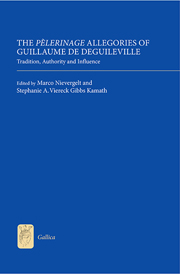Book contents
- Frontmatter
- Contents
- List of Illustrations
- List of Contributors
- Acknowledgements
- Abbreviations
- Introduction
- Part I Tradition
- Part II Authority
- 4 Les écrits pérégrins ou les voies de l'autorité chez Guillaume de Deguileville: Le modèle épistolaire et juridique
- 5 ‘Ce mauvais tabellion’: Satanic and Marian Textuality in Deguileville's Pèlerinage de l'Âme
- 6 Making Sense of Deguileville's Autobiographical Project: The Evidence of Paris, Bibliothèque nationale de France MS Latin 14845
- Part III Influence
- Bibliography
- Index
6 - Making Sense of Deguileville's Autobiographical Project: The Evidence of Paris, Bibliothèque nationale de France MS Latin 14845
from Part II - Authority
Published online by Cambridge University Press: 05 December 2013
- Frontmatter
- Contents
- List of Illustrations
- List of Contributors
- Acknowledgements
- Abbreviations
- Introduction
- Part I Tradition
- Part II Authority
- 4 Les écrits pérégrins ou les voies de l'autorité chez Guillaume de Deguileville: Le modèle épistolaire et juridique
- 5 ‘Ce mauvais tabellion’: Satanic and Marian Textuality in Deguileville's Pèlerinage de l'Âme
- 6 Making Sense of Deguileville's Autobiographical Project: The Evidence of Paris, Bibliothèque nationale de France MS Latin 14845
- Part III Influence
- Bibliography
- Index
Summary
Paris, BnF MS Lat. 14845 (hereafter ‘MS S’) is a fifteenth-century miscellany of predominantly religious prose and verse, written for the most part in Latin and owned by the medieval Parisian monastery of Saint-Victor. MS S is best known to modern scholars for recording Bernard of Clairvaux's appeal to the English for support of the Second Crusade (fols 287r–288v). Rather than the connection of MS S to this early member of the Cistercian order, however, this essay considers how MS S informs our understanding of the literature produced by the late medieval Cistercian monk, Guillaume de Deguileville. MS S provides valuable evidence concerning the manner in which Deguileville sought authority for his works, reflecting the author's determination to integrate autobiographical material into his didactic allegory and to address the interests of both vernacular and Latinate readers. Scholarship typically depicts Deguileville as the author of a French verse trilogy, comprised of PVH (extant in two versions), PA and PJC. These works did circulate together in manuscripts from an early date, and the three were printed together in early sixteenth-century Paris by Remboldt and Petit as Le Romani des trois pelerinaiges. But such tripartite characterization diminishes and oversimplifies Deguileville's literary production, reflecting the power of later reception rather than Deguileville's own presentation of his corpus.
- Type
- Chapter
- Information
- The Pèlerinage Allegories of Guillaume de DeguilevilleTradition, Authority and Influence, pp. 129 - 150Publisher: Boydell & BrewerPrint publication year: 2013

